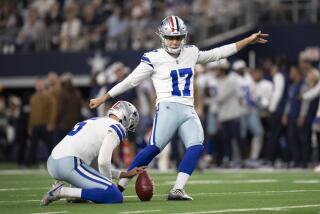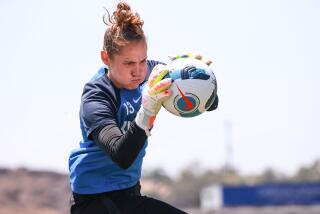American Abroad : Harkes of U.S. Soccer Team Makes Mark as Pro in England
- Share via
DERBY, England — The white BMW coupe sliced through the rain, embracing sudden corners and shouldering its way through narrow brick streets with a familiarity that has bred this speed and this control.
John Harkes guided the car with the same precision and confidence that have formed his career as a professional soccer player. It is a career that of necessity has taken him from his home in Kearney, N.J., all the long way back to his roots in Great Britain.
Harkes, with his German sports car in mute testimony, has succeeded, almost improbably. He’s an American flourishing in an English game. Because it is not possible to flourish in his own country. Because he wanted to play professional soccer.
Harkes, 26, is not the only expatriated American playing in European soccer leagues; there are 19 Americans playing on some level in Europe. Harkes is a member of the U.S. national team preparing for next summer’s World Cup, and like many of the American stars based abroad, he’s rarely with the team.
Harkes is a veteran of the 1990 World Cup team and is more useful to the team plying his trade as a professional. More than his ability, what sets Harkes apart is both his commitment to making it and the ease with which he has negotiated the myriad of cultural and professional obstacles to achieving that. Along the way, it’s been fun.
Happy behind the wheel of his young life, John Harkes is having a ripping good time.
*
“Harksie? If you hadn’t of mentioned it just then, I wouldn’t have remembered he was an American,” a soccer fan in London said.
Harkes could not have asked for a more sincere testimony to his assimilation. The kid from Joisey has been transformed into one of the lads, complete with an intermittent English accent.
“When I first got here, the fans were pretty rough,” Harkes said. “They said things like, ‘Go home, Yank. Play your own games.’ The way they saw it, it was like an American was taking English jobs. The players were the same at first. But once they saw you could play, they give you respect.”
Harkes came to England with better-than-average credentials. Harkes and high school teammate Tony Meola made tentative inquiries to English teams six months before the start of the 1990 World Cup. The pair had a two-week trial with the reserve and first team for Sheffield Wednesday of the first division, but left to rejoin the national team.
To the surprise of most observers, the United States qualified for the World Cup in Italy. Harkes started in the midfield and Meola started at goalkeeper.
Harkes made his way back to Sheffield in November after the World Cup, where he again encountered Coach Ron Atkinson. Atkinson made Harkes try out again, and Harkes decided to test the market. With an offer on the table at Sheffield, Harkes went to the Blackburn Rovers and Glasgow Celtic. Glasgow made an offer.
Sheffield and Atkinson beckoned. Harkes expected to do time on the reserve team. But a teammate’s injury opened a place for him on the first team. Something clicked after that. Harkes moved into the starting lineup and fans discovered his fast-paced, aggressive style.
“I began to be accepted,” he said.
Within a month, after he scored a spectacular goal, Harkes would be more than accepted.
Sheffield Wednesday was playing Derby County, Harkes’ current club, in a quarterfinal League Cup match. Early in the game, Harkes took a crossing pass just past midfield. Harkes, who had been complimented by the English press for his “English” style of play, took the ball and did something characteristically American. Harkes shot from 35 yards out and scored into the upper left corner against Peter Shilton, England’s World Cup goalkeeper and captain.
Harkes assisted on Sheffield’s second goal, thus helping his team to its first victory over Derby on Derby’s home ground in more than 50 years.
Harkes’ shot was later voted goal of the year, as much for its audacity as anything. The English considered Harkes’ shot reckless and admired it. If the American had truly studied the English style, he would have dribbled the ball through cleats-high defenders, fallen several times in the mud, taken the shot from two yards out, off balance, off his left foot and banged it in off the crossbar. In the rain.
“The next game at home the fans had come over to John’s side,” said Harkes’ wife, Cindy. “When he first came on the field, they began to chant, ‘Ooooh, ooooh, Johnnie Harkes!’ That was the breakthrough.”
Everything went right for Harkes that year, capped by Sheffield’s promotion to the first division at the end of the season and the team’s winning of the English FA Cup against Manchester United. Harkes became the first American to play at Wembley, England’s hallowed soccer ground. Players in England point their entire careers toward playing in Wembley; Harkes has played there three times.
For a kid who grew up in the shadow of Giants Stadium, who was a ballboy for the New York Cosmos, this was an atmosphere in which to revel. On the one hand, Harkes was away from his family and friends, living in a hotel in a foreign country. On the other, he was living in soccer heaven.
“In the first year, I was totally concentrated on football,” Harkes said. “When I wasn’t playing in games, I was going to watch them. I couldn’t believe how much soccer there was. It was so fun. People knew me on the street. They wanted to talk to me. The main thing was, I was finally respected for what I do.”
Sharing his love for soccer made Harkes’ transition easier. So did his family’s heritage--both his parents emigrated to the United States from Scotland. European club officials are wary of Americans. Many U.S. players get trials and don’t stick. They get homesick or can’t overcome the language barrier. Instead, Harkes has discovered long-lost relatives.
Harkes’ capitalization on--and apparent relish of--his opportunity has contributed to a change in attitude toward American players. The success of Harkes and other Americans in England--goalkeeper Kasey Keller plays at Millwall and midfielder Roy Wegerle plays at Coventry City--has increased the chances for a generation of American players who will follow.
*
Harkes leaned forward as he glanced over a shoulder. The very nice restaurant at the very expensive country club/hotel where Harkes and his wife are temporarily living was alive with eavesdroppers. The question was, “Why did you leave Sheffield Wednesday for Derby County?” And the considerable number of soccer fans in the restaurant strain to hear the answer.
After three years at Sheffield, in what is now called the Premier Division, Harkes was this summer transferred to Derby County, in the lower First Division. Why drop divisions and leave a club that’s a proven success in a city where you and your wife have friends?
The answer is complicated and necessitates a lowered voice. Harkes had a conflict with his coach, the volatile Trevor Francis. Despite Harkes’ proven skill, Francis could never get past his bias against American players. Harkes had difficulty getting released for U.S. national team games, a courtesy that teams extend to international players. Harkes can be expected to be called up with greater frequency by the U.S. team as it prepares for next summer’s World Cup, to be held in the United States.
Money, too, was a factor, although not the main one. Harkes was sold by the U.S. Soccer Federation to Sheffield in 1990 for little more than $100,000. His transfer fee this summer was said to be more than $2.5 million. At Sheffield, Harkes began to form an opinion that, as an American, his salary was substantially lower than his European teammates.
“As an American player, they didn’t respect me as far as salary,” Harkes said
It was different with Derby’s coach, Arthur Cox. Cox met with Harkes and told him straight out that he respected Harkes and wanted him on the team. Harkes, Cox thought, could help the rising team get promoted this season. Cox told Harkes he would be released for international events.
Harkes moved. Last week, much of the couple’s few possessions was still stashed in the back of Cindy’s car.
As much as a couple can while living out of suitcases and a back seat, the Harkeses have settled in. John is getting to know his Derby relations. His uncle and a cousin live here; his cousin plays American football.
Cindy--who met John while both attended the University of Virginia, where she was an All-American on the women’s soccer team--has joined the Stanton Rangers in the barely tolerated English women’s Premier League.
The Harkeses talk of raising a family in the United States and are trying to buy a house in Virginia. But they know that the experience John is having as a professional soccer player cannot be found at home. Home will have to be England, or wherever the soccer winds blow them.
Wherever he ends up, be sure that John Harkes is in complete control. And having fun.
More to Read
Go beyond the scoreboard
Get the latest on L.A.'s teams in the daily Sports Report newsletter.
You may occasionally receive promotional content from the Los Angeles Times.







